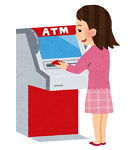4. Finance
A. Pension
All foreigners between the ages of 20 and 59 must contribute to the national pension system (nenkin). Certain companies also have Employee Pension.
After you enroll, you will receive a pension number for managing coverage records. Pension is paid monthly, either by paying on your own, or by having it automatically deducted from your paycheck.
If you leave Japan, as a foreigner you are eligible to receive a lump-sum payment of part of your contributions while in Japan. You must apply within two years of leaving Japan. For more information, visit the Japan Pension Service website (English and Japanese):
B. Banking
Types of Accounts
Although various types of accounts such as company and long-term savings accounts can be opened at the bank, the most commonly used type is the ordinary deposit or savings account (futsu-yokin).
Opening an Account
You can open an account at a bank, credit union (shinyou-kinkou), post office, etc. To open an account, in order to prove your address, you will need personal identification such as your resident registration card. Also, most banks will require that you have a personal seal (hanko or inkan).

Automatic Payment of Bills
Payments for many public utilities can be made directly from your bank or postal account each month. Among the bills that can be paid automatically are: water, electricity, gas, NHK TV service, other satellite TV services, taxes, and telephone (both domestic and international).
Each utility has a separate form that will need to be filled out, requesting that your bills be automatically paid each month. Consult with your utility provider to find out how to do automatic payment.
C. ATMs
As in other countries, you can withdraw money from your bank or postal account at an automatic teller machine (ATM) using a cash card. You can also deposit money, make bank transfers, check your current balance, and conduct other transactions.
ATMs have much more limited hours than in other countries. They may only be open during weekday business hours, and closed during holidays.
Generally, your ATM card can be used at most banks, or at an ATM in a convenience store. A surcharge will likely be added if you use an ATM other than at your bank, or during certain times of day. Postal Savings cash cards can be used at any post office ATM machine in Japan.

How to Use a Japanese ATM
ATMs can differ greatly from bank to bank and even from branch to branch of the same bank, and for most, the options can be displayed in English by selecting the “English” button. Be aware that some types of transactions may only be able to be conducted in the Japanese language setting.
| 暗証番号(あんしょうばんごう) | PIN number |
| お引出し(おひきだし) | Withdrawal |
| お預入れ(おあずけいれ) | Deposit |
| お振込み(おふりこみ) | Money Transfe |
| 残高照会(ざんだかしょうかい) | Current Balance |
| 通帳記入(つうちょうきにゅう) | Update bankbook |
| 訂正(ていせい) | Correction |
| 取消(とりけし) | Stop Transaction |
| 確認(かくにん) | Confirm Entry |
| 万(まん) | 10,000 |
| 千(せん) | 1,000 |
| 円(えん) | yen |
D. Sending Money
Domestic Money Transfers
Domestic money transfers (振込 furikomi) can be made from any bank to any other bank account in Japan. There are both ordinary and telegraphic transfers available, with telegraphic transfers being slightly faster and more expensive. It is also cheaper to send money to an account within the same bank than to one in a different bank.
In addition to filling out the proper forms and paying at a teller’s window, it is also possible to make transfers using your cash card. The ATM will prompt you for the amount of money you want to send, then ask you for the bank, branch name or number, account type, and account number. You will need to know the bank and branch name in Japanese in order to do this.
Sending Money Abroad
Money can be sent to most countries from banks that offer foreign money transfers. You can also send money abroad through the main branch of the post office, or using private services such as Wise. Electronic transfers via app or internet are usually the most convenient, and have the most competitive exchange rates.

Exchanging Money
Money can be exchanged at the main branches of most banks, but check what currencies are available beforehand. Most main post offices are also equipped to exchange money.
Money can also be exchanged at airports and specialty shops. The closest exchange stores are in Sapporo.
E. Post Office Services
There are many Post Offices in Iwamizawa with different opening and closing times; however, in general Post Office opening hours in Japan tend to be shorter than what you may be used to.
For more information on Japanese Post Offices, their postal and banking services etc., see their Japan Post website (English)








更新日:2024年09月24日